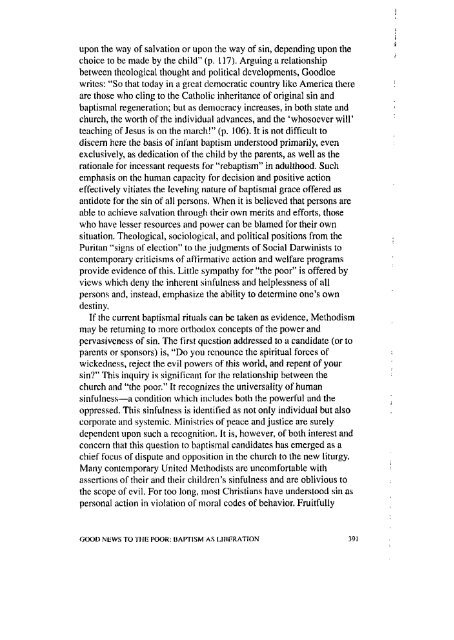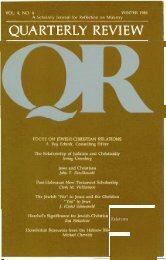Winter 1994 - Quarterly Review
Winter 1994 - Quarterly Review
Winter 1994 - Quarterly Review
Create successful ePaper yourself
Turn your PDF publications into a flip-book with our unique Google optimized e-Paper software.
upon the way of salvation or upon the way of sin, depending upon the<br />
choice to be made by the child" (p. 117). Arguing a relationship<br />
between theological thought and political developments, Goodloe<br />
writes: "So that today in a great democratic country like America there<br />
are those who cling to the Catholic inheritance of original sin and<br />
baptismal regeneration; but as democracy increases, in both state and<br />
church, the worth of the individual advances, and the 'whosoever will'<br />
teaching of Jesus is on the march!" (p. 106). It is not difficult to<br />
discern here the basis of infant baptism understood primarily, even<br />
exclusively, as dedication of the child by the parents, as well as the<br />
rationale for incessant requests for "rebaptism" in adulthood. Such<br />
emphasis on the human capacity for decision and positive action<br />
effectively vitiates the leveling nature of baptismal grace offered as<br />
antidote for the sin of all persons. When it is believed that persons are<br />
able to achieve salvation through their own merits and efforts, those<br />
who have lesser resources and power can be blamed for their own<br />
situation. Theological, sociological, and political positions from the<br />
Puritan "signs of election" to the judgments of Social Darwinists to<br />
contemporary criticisms of affirmative action and welfare programs<br />
provide evidence of this. Little sympathy for "the poor" is offered by<br />
views which deny the inherent sinfulness and helplessness of all<br />
persons and, instead, emphasize the ability to determine one's own<br />
destiny.<br />
If the current baptismal rituals can be taken as evidence, Methodism<br />
may be returning to more orthodox concepts of the power and<br />
pervasiveness of sin. The first question addressed to a candidate (or to<br />
parents or sponsors) is, "Do you renounce the spiritual forces of<br />
wickedness, reject the evil powers of this world, and repent of your<br />
sin?" This inquiry is significant for the relationship between the<br />
church and "the poor." It recognizes the universality of human<br />
sinfulness—a condition which includes both the powerful and the<br />
oppressed. This sinfulness is identified as not only individual but also<br />
corporate and systemic. Ministries of peace and justice are surely<br />
dependent upon such a recognition. It is, however, of both interest and<br />
concern that this question to baptismal candidates has emerged as a<br />
chief focus of dispute and opposition in the church to the new liturgy.<br />
Many contemporary United Methodists are uncomfortable with<br />
assertions of their and their children's sinfulness and are oblivious to<br />
the scope of evil. For too long, most Christians have understood sin as<br />
personal action in violation of moral codes of behavior. Fruitfully<br />
GOOD NEWS TO THE POOR: BAPTISM AS LIBERATION 391












